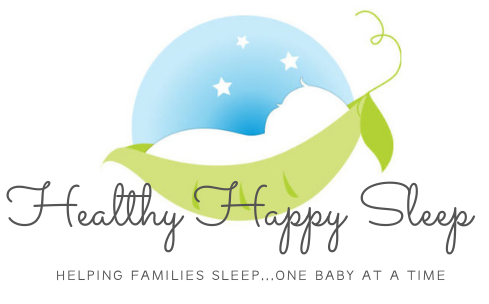Sleep Associations: Is it OK to help your baby sleep?

If you have a very young baby at home, you may have heard the term “sleep associations” and worry about how this could affect your baby’s sleep.
Depending on your child’s age, these can be either helpful or harmful when it comes to successful self-soothing, sleep cycle transitions, long naps, and sleeping through the night.
In fact, most parents who hire me need help teaching their baby to disassociate a particular crutch with falling asleep.
Sleep associations are a big deal! If left to go on too long in a child’s development, the expectation and reliance on them grows more intense over time. Very often parents are just as attached to these sleep crutches as the baby is!
What is a Sleep Association?
It is anything external that a baby needs in order to fall asleep. Some common examples are:
- the motion of a swing
- bouncing on an exercise ball
- nursing to sleep
- a bottle
- rocking/holding/patting
- bed sharing
- parental presence
When a baby is put to sleep the same way every time using any sort of external stimulation, it becomes the only way he can go from the awake state, to the sleep state. When he wakes in the night, or in between sleep cycles, he will wonder where that person, food, smell, feeling went that he remembers from the last time he was awake. He will cry out and become agitated, restless and confused until that familiar intervention is provided to help him return to sleep.
This becomes a problem as babies mature because these dependencies grow stronger every time they are used to encourage sleep.
The question becomes, when is it ok to use sleep crutches, and when and how should we start incorporating self-soothing into a baby’s sleep routine?
Sleep associations don't form until the 12 week mark. Yay! This means that if your baby is less than 12 weeks old, you can ENJOY YOUR BABY without stressing about if you’re inadvertently creating a sleep issue. Nurse him to sleep, cuddle him, let him sleep in the swing if it soothes him. Wear him in a carrier or wrap, watch TV with him on your chest...all of these things are not only ok during these early weeks, but are recommended, vital aspects of the parent/newborn relationship!
I always feel a sense of freedom when my babies are in the early weeks of life because there's no sleep schedule to worry about, and we can go wherever, whenever without worrying about the sleep environment. Soak it up, try to relax and savor the spontaneity by doing whatever works to soothe your baby!

Tips to encourage self-soothing:
Beginning at the 8-week mark, start letting him practice falling asleep without your help. He may surprise you!
- Watch him closely for “sleepy cues” so that he doesn’t become an overtired baby, and aim to put him down awake 5-10 minutes before they typically start showing up. Some examples of sleepy cues are: rubbing eyes, pulling at ears, fussiness, blank staring, excitability, etc. Watching for these is very important so that his wake windows don’t stretch out too long!
- Lay him down awake during the sleep periods that are usually easiest for him (typically the first nap of the day and bedtime), and wait to see what he does. If he cries, pick him up and soothe him, but as soon as he's calm (and still awake) lay him back down. Repeat until he falls asleep. Try for 20-30 min, and if he doesn't settle in that amount of time, use the methods he likes to help him fall asleep quickly. Practice makes perfect, so don't get discouraged if he doesn't fall asleep on his own every single time!
- Don’t rush to intervene every time he makes a sound, instead make yourself stop and count to 10 before responding. He’ll need you to let him find his own way of soothing himself, so give him freedom to figure it out. Many times babies are capable of doing more than we give them credit for if we just slow down and wait it out a bit.
By 16-weeks, if he's still not falling asleep on his own, it's time to get in touch with me so that I can help you ditch those pesky sleep associations and teach him this important skill! Every aspect of his sleep will improve when he learns how to soothe himself to sleep. We'll make sure his schedule is coming together, look at his sleep environment, and determine what he needs to master this skill.
